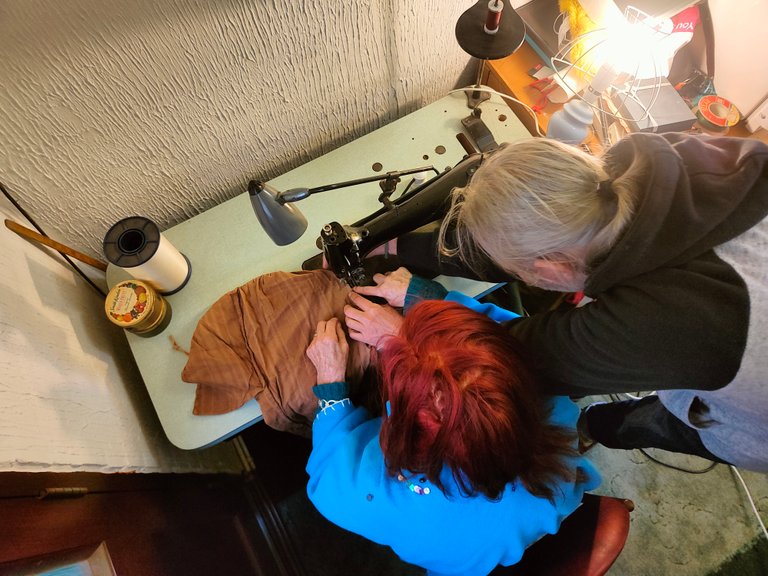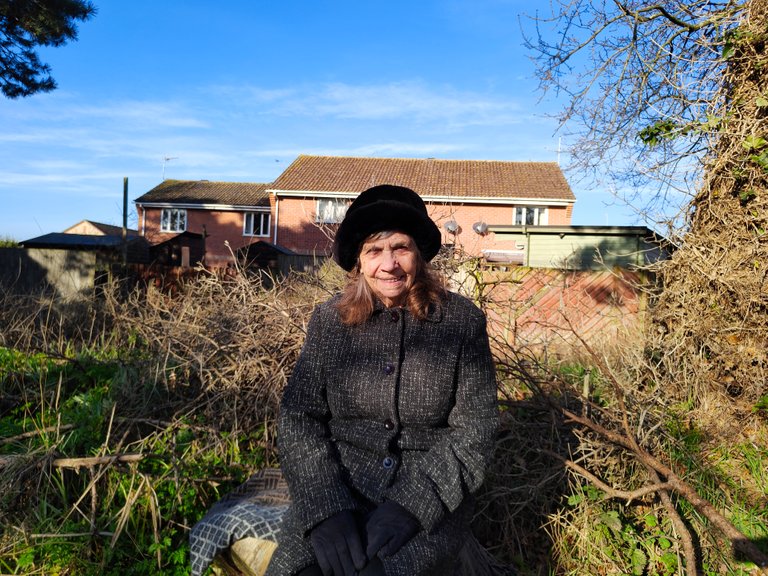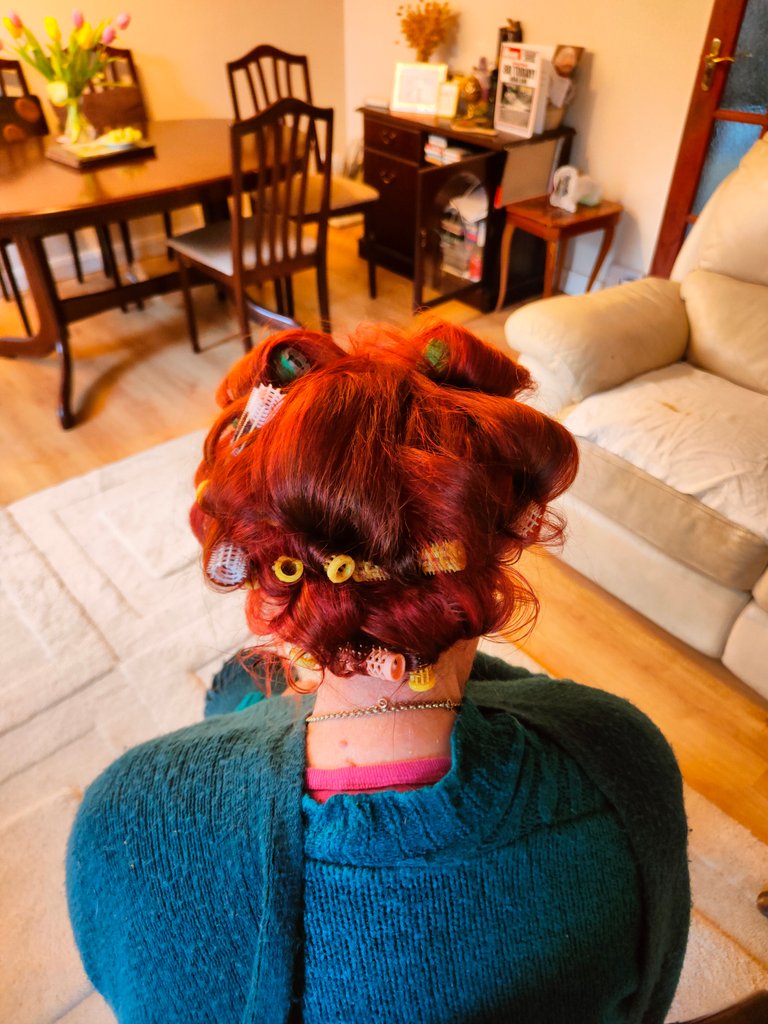Natural medicine is comes from within us.
Home-based occupational therapy is crucial for elderly people who are not in Nursing Homes or living with their relatives. A good example of this is an 87-year old lady with dementia who lives in a small town near to London. I will call her Rose for anonimity. I spent two months of constant, shared living with her, and this opportunity gave me a closer look at dementia. In the last five years, Rose's dementia has progressed to the third stage - it got especially worse during the covid period, when her social contacts were cut off and even her granddaughter, who used to visit her regularly, moved away for a good hour's drive from her. In this situation, the outpatient service started with two visits, in the morning and in the afternoon, when it was time for pills. Rose was left alone as the days passed and her condition worsened. When her son returned to Great Britain after three years and visited his mother, he saw that this was not the case. Rose needs a person to live with her. She began to notice a lack of energy, more pronounced problems with communication, the inability to prepare meals or the inability to take care of a tidy home.
Rose is lucky to have sewed in her life. Her focus is to be very clear in the present moment and she carefully follows everything that is happening and listens to what people are talking about, even if she is not personally involved in the conversation or society automatically excludes her from active conversation with the assumption that she is demented. Because of her strong character, as @atma.love (her son) mentioned, Rose was reluctant to admit that she was forgetting from when it first began. But now she is at least partially aware that her memory is bad. Some days are better, some days are worse. She does not recognize relatives, often misses the toilet and does not like to bathe. She has a moderately good time orientation, as she regularly monitors what time it is. She is aware that we are in the winter time, that it is morning or afternoon. Occasionally, by agreement, she remembers that she has a shower at 10 p.m. or she does not remember the evening agreement to take a bath in the morning. So we set up bathing days that she chose herself. Rose dresses herself and feeds herself. It is important to take care of washed clothes and check the bed. Occasionally the toilet or bed is soiled.
The purpose of this article is primarily to explain the findings of how a person can progress with active occupational therapy at home, which includes not only the basic assistance that the person needs, but also time for creativity and the inclusion of the person in normal functioning, the possibilities of choosing, making arrangements. Above all, it is important that a person has a sense of validity, etc. I would suggest two-month programs where occupational therapists are hired to live with elderly people or even more – if communities of like-minded people develop, it will be one of the great advantages for the care of the elderly in the home environment.
Someone asked me what it's like to live with a person who has lost their identity. That bothered me. Attention, a person loses his identity only if his relatives allow him to do so.
We often started talking about her son. I praised his concern for her. I mentioned him several times, said that he was her son, that he prepares food, that he smokes on the terrace, that he wants her to eat healthy, etc. It also happened a few times that she managed to look at him as an interesting man for her, and when she realized again that he was her son, she just said: "Oops". Then she began to inquire after him; where is he, what is he doing. All this placed her in the happenings in the house. With these examples, I began to realize that the consciousness of a person with dementia must be illuminated at every step, with clarity, patient explanation, personal and on a deeper level of perception. and also that the person will respond according to our actions. p.s. Rose even mentioned during the two days that she couldn't stand this man at all.
Believe it or not, the comments from Rose sometimes absolutely coincided with my inner mindfulness. Sometimes I even asked her to repeat. I was lucky because she often remembered.
Rose used to play the piano. We trained using an old keyboard and it was extremely important to her and a pleasure when she could teach me the only song she still knows how to play. Her reading is medium fluent. I checked reading and writing when I found her diary. She read it several times with interest. I encouraged her to write something as well, but we only managed to write down the date and then write down the family tree of her closest relatives, because mostly she only remembered life with her parents and brother, and it was hard for her to understand that she had a daughter who calls at least once per day. She does not like this call very much, but it is true that this call enables her social inclusion.

"Just as Rose recalled a song, so Rose can recall her life," was my hope.
One morning, after a really good night of music, Rose looked as if something had dawned on her. She didn't stop talking. She described everything she saw and only occasionally got stuck on a word. She was like a child who demands 100% attention, if you can imagine. I was very happy, so I extended my stay with her. Atma reduced his intake of pills, instead of four pills a day, to two pills and began gradual treatment with MMS, a water purifier in the body. Rose's eyes were becoming more present. We talked concretely about what was happening, grew four plants and cleaned her closet concretely.
We also introduced a bath chair because she had problems sitting in the bathroom, so she didn't like bathing either. The procedure was quite demanding, because she didn't want this help: "I've been bathing without this all my life, I don't want this chair in the bath," she fought for her independence. We recommended a high-quality chair that can automatically move itself to the bottom of the bath. The introduction was gradual. I slowly taught her how to use it herself. I also took the chair for free, because she didn't want it, and when she saw that she really couldn't do it, I offered it to her again and showed her that she was safer with it. Rose knew she didn't like bathing, but she forgot why. Her problem with getting up and sitting down in the bathroom was quite terrible for her. When I left, I tried to give Atma a way to continue teaching her how to use the chair herself. A person with dementia is primarily concerned with safety. We built trust. The more active she was, the less indulgent she was.
As a point of interest. Several times I wore one of Rose's clothes to attract attention and maybe even find out that it was hers. This happened on the penultimate day of my departure. I packed my clothes and put on a very nice sweater.
"Is that my sweater?" she asked. “Yes, Rose! It's your sweater!” I enthusiastically agreed. She told me that she had sewn it herself, that it was very dear to her heart, and at the end she added: "You can take it off in the evening, I won't give it to you because it is very dear to me." We laughed.
She was no longer able to use knitting needles, but with my help she sewed a button on a jacket almost independently, and once we sat her down at her sewing machine, where she sewed a torn dress.
There was no lack of humor in the second part of the month.

Personally, I think that e.g. a one-year treatment of a person (who is at this stage), with extremely careful and slow establishment of a normal living environment, contributed to greater independence of the demented person and possibly even established new conditions for greater social inclusion. Rose used to actively play cards with her friends, but later they no longer visited her. In order to be able to maintain this association, a good assistant could help with such meetings. Rose has not lost her sense and concern for serving guests. When her brother and sister-in-law visited her, she thought very seriously about who would provide the food, and even the night before the arrival, we chose a special dress to greet the guests. One of the main causes of the development of dementia is certainly bad society, which does not mean that there are bad people, but unmotivated conversations in society. This means that you are talking to a person, but this person is not listening to you, just nodding. The alienation of the listener is so harmful that changes begin in the cerebral cortex.
In addition to the main reasons that prove the development of dementia, such as poor nutrition, brain inactivity and the like, I would like to point out a few more possible reasons, exclusively for Rose's case, which I know. One of the causes of the development of dementia is certainly bad company, which in this case means a company that is not motivated to talk. This means that you are talking to a person, but this person is not listening to you, just nodding, alienated (I'm caricaturing) in his internal conflict. The alienation of the listener is so harmful that changes begin in the cerebral cortex. Especially with an emotionally wounded person.
Let's be good listeners. Let's focus on the person we are talking to. With this, we also offer only good to our brain, at the same time we develop awareness and emotional intelligence.
The very important fact that our brain tissue renews itself even in old age can provide us with results if we approach dementia correctly. The main center for memory is called the Hippocampus, but we also know the emotional memory center called the amygdala. Autonomy is simple and requires training.
Another reason I noticed was Rose's attitude towards her daughter. On the daily call, Rose commented, "Oh, how annoying this woman is, she can't even talk, she's so sad, she doesn't understand the law," etc. Intuition told me that if Rose had been reacting in this way towards her own daughter throughout her life, the decline of her memory could be a karmic consequence of such an attitude. So, I'm talking about the possibility of self-judgment.
Atma mentioned that she used to forget where she left her keys, etc.
What I want to emphasize is the in-depth holistic treatment. Get down to a personal relationship. This is the key to effective work-therapeutic treatment.
I am sorry to say that public health care is limited by staff and unorganized in terms of time. I am saddened that competition between therapists often turns out to be instead of benevolent cooperation to improve a person's life.
People in many institutions are unable to achieve effective rehabilitation because of this problem. Every person deserves specific therapeutic care, at home or in an institution, and professional cardiac therapists.
These were some glimpses of Mrs. Rose's unmotivated service. I am very grateful for the experience. And thank you Spominčica for your mission. My grandmother also died of dementia. Unfortunately, I could not approach in the way I would have liked.
With simple guidelines on what is most important for a person with dementia, I revived my knowledge from my college years and was able to act for Rose's highest good.
https://www.spomincica.si/

All photos taken by me (unless noted otherwise)
Thank you for reading this post.
Dementia is very bad sickness for the elderly, I remembered my father suffered that at age 88 or so. My Mum and other family members tried so much to care for him, all they need is someone to be around.
Thanks so much for throwing more light on this article @samsidhicosmica
Thank you, for the comment.
I know. My grandmother was in the last stage when the family told me that demencia is so far. I was not in my country. Also when I came back it was difficult to teach relatives and they decided to put her in nursing home. She died there within a two months.
I visited her in the home and sang to her. She was really beautiful the last time I saw her.
Much love 💕
Thanks for all that support given her then @samsidhicosmica
@atma.love you may be interested in this review